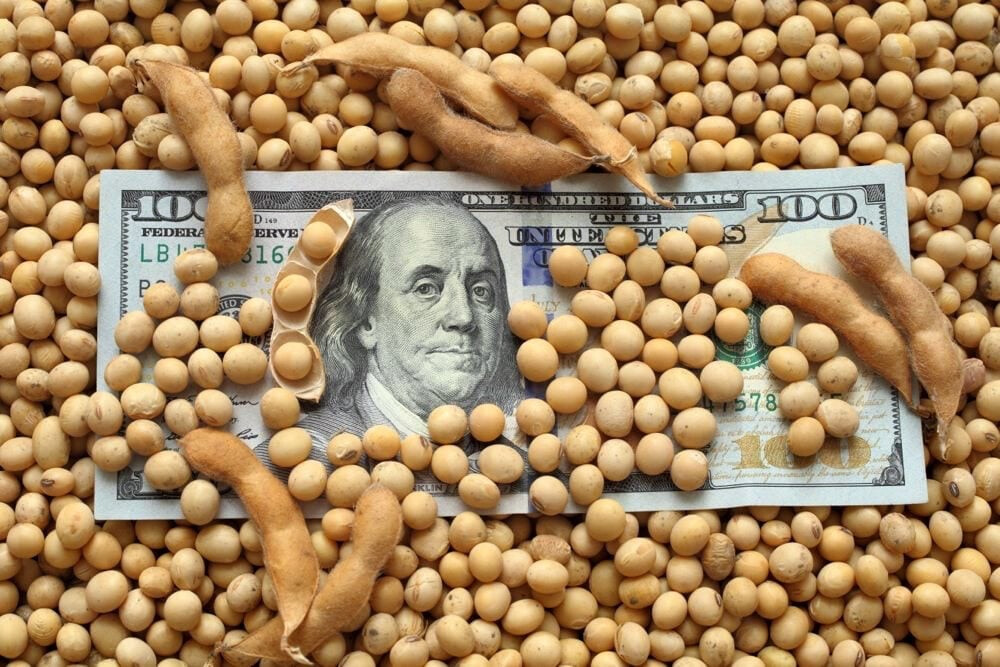
Between May 16th and 22nd, soybean futures prices on the Chicago Board of Trade (CBOT) saw an upward trend. Soybean prices rose by 16.2 cents from the previous week, reaching 1,067.4 cents per bushel. This price increase resulted from concerns over soybean crop quality due to excessive rainfall in Argentina and excessive humidity in the U.S. Midwest, acting as short-term price support factors. Conversely, a decline in oil prices put downward pressure on soybean prices.
Extreme Weather in Argentina and Soybean Crop Conditions
Argentina, the world's third-largest soybean producer and a major exporter of soybean oil and meal, has its crop conditions significantly impact the international soybean market. Recently, excessive rainfall in Argentina has disrupted soybean harvesting, raising concerns about the deterioration of harvested soybean quality. When there's heavy rain during harvest, the moisture content of the beans increases, reducing their storability and raising the risk of mold. This can negatively affect the quality of the final product and processing efficiency, leading to reduced farm income.
Specifically, the Pampas region, Argentina's primary grain belt, has experienced extreme weather events in recent months. Fluctuating weather patterns, including sudden torrential downpours after severe droughts, have made crop cultivation difficult. This weather impacts not only soybeans but also other major crops like corn, potentially destabilizing overall agricultural production. The Argentine government and agricultural organizations are closely monitoring the weather situation and considering measures to minimize crop damage.
Excessive Humidity and Planting Delays in the U.S. Midwest
The United States is the world's largest soybean producer, with the Midwest being a key growing region. Recently, excessive humidity in the U.S. Midwest has caused delays in soybean planting. While adequate soil moisture is crucial for planting, excessive humidity makes the soil muddy, hindering farm machinery and increasing the risk of seed rot. If planting is delayed, the crop's growth period shortens, potentially leading to reduced yields or lower quality.
According to the U.S. Department of Agriculture (USDA)'s weekly crop progress report, soybean planting progress in several Midwestern states is behind historical averages. This is because farmers are reluctant to work in wet fields or fear that seeds may not germinate properly after planting. If planting delays become prolonged, it could lead to a downward revision of the overall U.S. soybean production forecast, potentially causing an even greater ripple effect in the international soybean market.
Downward Pressure from Falling Oil Prices and the Biodiesel Market
In contrast to crop concerns supporting soybean price increases, falling international oil prices are putting downward pressure on soybean prices. This is because soybeans are a major raw material for biodiesel production. When oil prices fall, biodiesel becomes less price-competitive, which can lead to a decrease in demand for soybean oil and negatively impact soybean futures prices.
Recently, international oil prices have been volatile due to various factors, including concerns about a global economic slowdown, the possibility of increased production by OPEC+, and fluctuations in supply from major oil-producing countries. While lower oil prices have the positive effect of reducing transportation costs, they can also dampen demand for energy crops like soybeans, presenting a dual impact. Soybean market participants are closely monitoring oil price trends alongside crop conditions to formulate investment strategies.
Complex Factors in the Global Soybean Market
The recent rise in CBOT soybean prices is not solely due to weather issues in Argentina and the U.S. but also a result of various complex factors, including global supply and demand balance, geopolitical risks, and exchange rate fluctuations.
China's Soybean Demand: As the world's largest soybean importer, China's demand trends significantly influence international soybean prices. Increased pork production and expansion of the feed industry in China contribute to higher soybean imports, but an economic slowdown within China or its self-sufficiency food security policies could curb demand.
Brazil's Crop Conditions: As the world's largest soybean producer, Brazil's crop conditions are also crucial. Recent floods in southern Brazil have severely impacted agricultural production, intensifying concerns about soybean supply. However, crop conditions in central-western and northern Brazil are favorable, making the overall production volume still uncertain.
Exchange Rate Fluctuations: Currency fluctuations in major soybean exporting countries like Argentina and Brazil affect soybean prices. A weaker domestic currency can boost export competitiveness and increase export volumes, but a stronger U.S. dollar simultaneously increases the cost of purchasing soybeans for importing countries.
Speculative Capital Inflows: Given the nature of the futures market, the inflow and outflow of speculative capital from hedge funds and other entities also amplify short-term price volatility.
Future Outlook and Market Response
Agricultural market analysis organizations like UkrAgroConsult provide detailed information on these latest paid trends. Through their paid subscription service, "Black Sea Vegoils," and innovative agricultural market tool, "AgriSupp," users can access comprehensive information on oilseeds/vegetable oils and feed exports, crop-specific supply and demand balances, price trends, crop status, and harvesting/planting progress in Black Sea countries. This information is essential for agricultural market participants to effectively respond to rapidly changing market conditions and make strategic decisions.
Considering the current situation, supply instability due to weather issues in Argentina and the U.S. Midwest is expected to support soybean prices in the short term. However, the soybean market could experience significant fluctuations at any time depending on oil price volatility, Brazil's crop conditions, and the overall global economic situation. Market participants will need to approach the market cautiously, closely monitoring weather forecasts, government reports, and policy changes in major producing and consuming countries. In the long term, as climate change is expected to lead to more frequent extreme weather events, ensuring agricultural production stability and enhancing supply chain resilience will be key challenges for the international soybean market.
[Copyright (c) Global Economic Times. All Rights Reserved.]






























